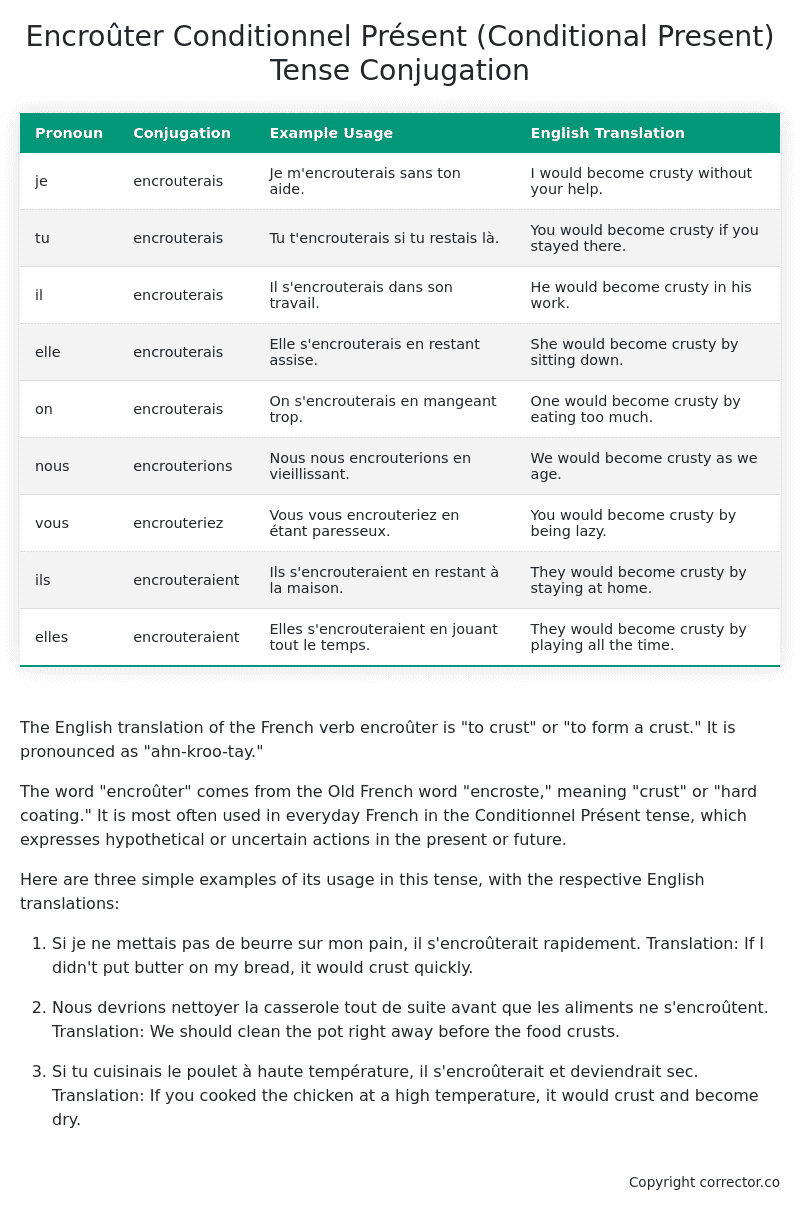Conditionnel Présent (Conditional Present) Tense Conjugation of the French Verb encroûter
Introduction to the verb encroûter
The English translation of the French verb encroûter is “to crust” or “to form a crust.” It is pronounced as “ahn-kroo-tay.”
The word “encroûter” comes from the Old French word “encroste,” meaning “crust” or “hard coating.” It is most often used in everyday French in the Conditionnel Présent tense, which expresses hypothetical or uncertain actions in the present or future.
Here are three simple examples of its usage in this tense, with the respective English translations:
-
Si je ne mettais pas de beurre sur mon pain, il s’encroûterait rapidement.
Translation: If I didn’t put butter on my bread, it would crust quickly. -
Nous devrions nettoyer la casserole tout de suite avant que les aliments ne s’encroûtent.
Translation: We should clean the pot right away before the food crusts. -
Si tu cuisinais le poulet à haute température, il s’encroûterait et deviendrait sec.
Translation: If you cooked the chicken at a high temperature, it would crust and become dry.
Table of the Conditionnel Présent (Conditional Present) Tense Conjugation of encroûter
| Pronoun | Conjugation | Example Usage | English Translation |
|---|---|---|---|
| je | encrouterais | Je m’encrouterais sans ton aide. | I would become crusty without your help. |
| tu | encrouterais | Tu t’encrouterais si tu restais là. | You would become crusty if you stayed there. |
| il | encrouterais | Il s’encrouterais dans son travail. | He would become crusty in his work. |
| elle | encrouterais | Elle s’encrouterais en restant assise. | She would become crusty by sitting down. |
| on | encrouterais | On s’encrouterais en mangeant trop. | One would become crusty by eating too much. |
| nous | encrouterions | Nous nous encrouterions en vieillissant. | We would become crusty as we age. |
| vous | encrouteriez | Vous vous encrouteriez en étant paresseux. | You would become crusty by being lazy. |
| ils | encrouteraient | Ils s’encrouteraient en restant à la maison. | They would become crusty by staying at home. |
| elles | encrouteraient | Elles s’encrouteraient en jouant tout le temps. | They would become crusty by playing all the time. |
Other Conjugations for Encroûter.
Le Present (Present Tense) Conjugation of the French Verb encroûter
Imparfait (Imperfect) Tense Conjugation of the French Verb encroûter
Passé Simple (Simple Past) Tense Conjugation of the French Verb encroûter
Passé Composé (Present Perfect) Tense Conjugation of the French Verb encroûter
Futur Simple (Simple Future) Tense Conjugation of the French Verb encroûter
Futur Proche (Near Future) Tense Conjugation of the French Verb encroûter
Plus-que-parfait (Pluperfect) Tense Conjugation of the French Verb encroûter
Passé Antérieur (Past Anterior) Tense Conjugation of the French Verb encroûter
Futur Antérieur (Future Anterior) Tense Conjugation of the French Verb encroûter
Subjonctif Présent (Subjunctive Present) Tense Conjugation of the French Verb encroûter
Subjonctif Passé (Subjunctive Past) Tense Conjugation of the French Verb encroûter
Subjonctif Imparfait (Subjunctive Imperfect) Tense Conjugation of the French Verb encroûter
Subjonctif Plus-que-parfait (Subjunctive Pluperfect) Tense Conjugation of the French Verb encroûter
Conditionnel Présent (Conditional Present) Tense Conjugation of the French Verb encroûter (this article)
Conditionnel Passé (Conditional Past) Tense Conjugation of the French Verb encroûter
L’impératif Présent (Imperative Present) Tense Conjugation of the French Verb encroûter
L’infinitif Présent (Infinitive Present) Tense Conjugation of the French Verb encroûter
Struggling with French verbs or the language in general? Why not use our free French Grammar Checker – no registration required!
Get a FREE Download Study Sheet of this Conjugation 🔥
Simply right click the image below, click “save image” and get your free reference for the encroûter Conditionnel Présent tense conjugation!

Encroûter – About the French Conditionnel Présent (Conditional Present) Tense
Formation
Common Everyday Usage Patterns
Expressing Polite Requests
Expressing Hypothetical Situations
Expressing Doubt or Uncertainty
Interactions with Other Tenses
Present Tense
Past Tense
Future Tense
Conditional Perfect
Summary
Want More?
I hope you enjoyed this article on the verb encroûter. Still in a learning mood? Check out another TOTALLY random French verb conjugation!


